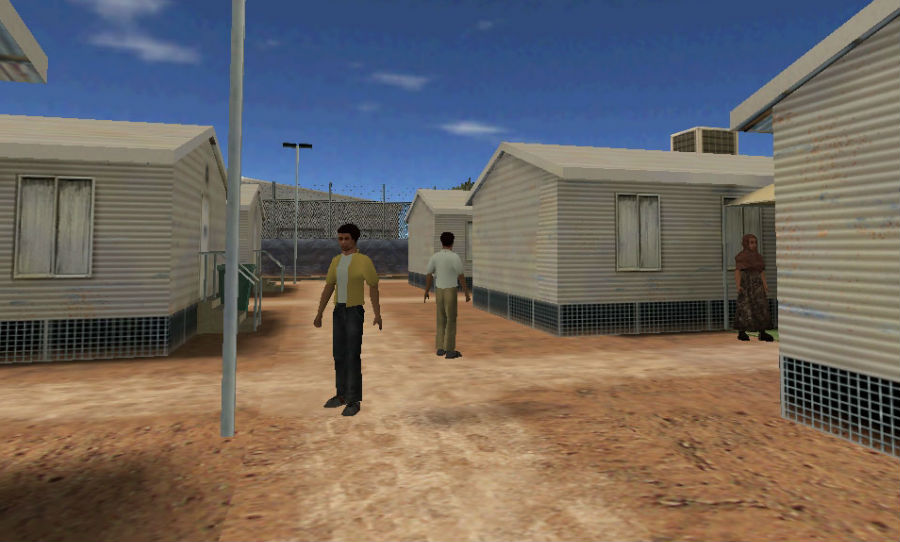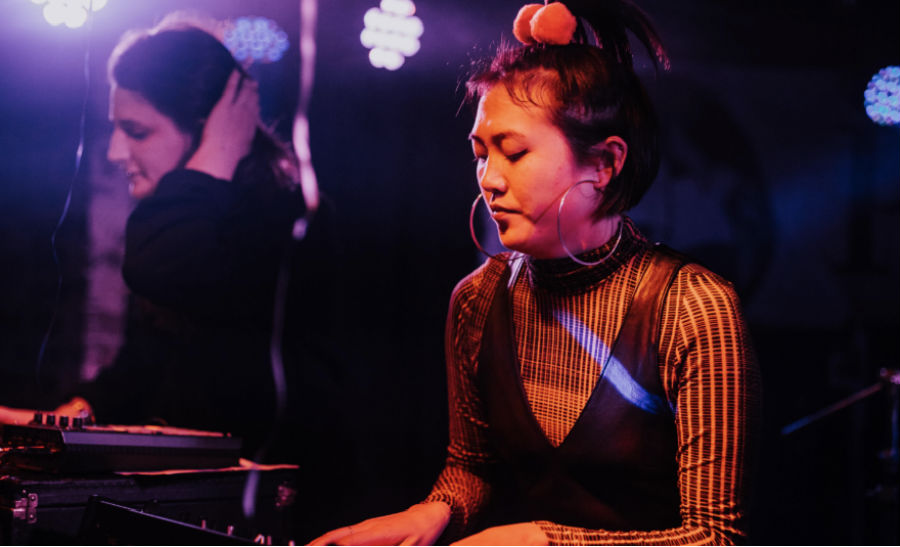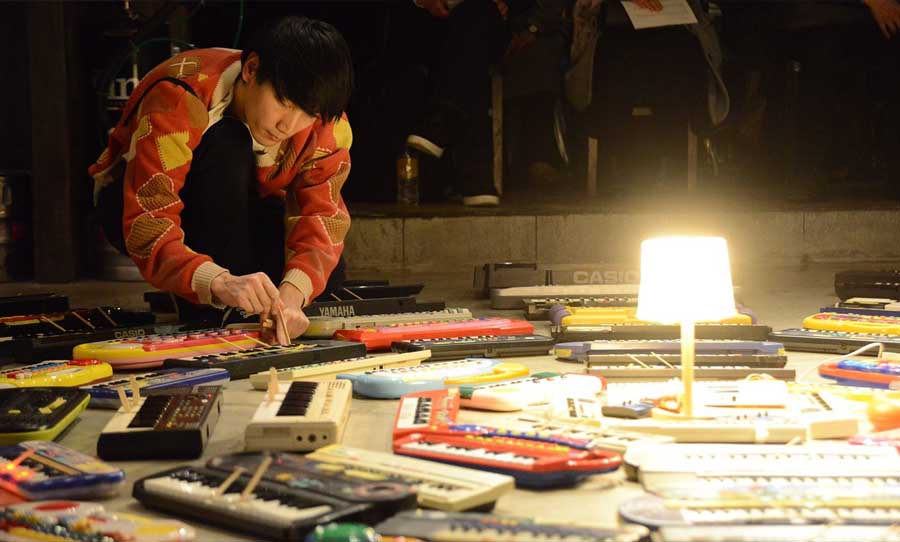Later this month, as part of Liveworks Festival of Experimental Art, a revisited edition of the 2003 video game Escape From Woomera will be premiered.
The controversial and politically explosive game invited players to put themselves in the shoes of a refugee held in immigration. So before its premiere we caught up with Simon Vaughan and Emma McManus, two Applespiel artists working on the new edition, to discuss the game’s relevance today.
Before the world premiere of Return To Escape From Woomera next month at Liveworks Festival of Experimental Art, we caught up with Simon Vaughan and Emma McManus from Applespiel.
HAPPY: It’s been almost 15 years since you first released Escape From Woomera, and it feels like the public reception to the video game has become a lot more positive over time… why do you think this has been the case?
APPLESPIEL: I think partly it’s because video games are no longer seen as trivial. I think at the time a lot of people felt like video games were for children and trying to use them to make a political point was ridiculous. 15 years later video games have become so normal that people across pretty much every generation plays them in some way or another and so now they’re just another part of the cultural landscape. I think with mobile phones becoming so ubiquitous, the last group of people who hadn’t played any kind of game started trying things out (even if it’s only solitaire like my dad). So now the idea that you’d make a political point using a video game doesn’t seem quite as far fetched.
HAPPY: When it was first announced that the project had been commissioned, there was a lot of backlash from the Australian Government… why do you think this was? Do you think if the announcement was made today, the government backlash would be similar?
APPLESPIEL: I think it makes sense to be honest. The game was being directly critical of government policy and using a form that was at the time largely thought of as a trivial hobby for children. Perhaps more surprising was that the government felt it was within their purview to attack an arts funding decision that is meant to be independent of government. I like to think things would be different today, but I doubt it. It feels like the government is more and more comfortable attacking decisions made by independent bodies and that the idea of arms-length funding is no longer considered sacred. You only have to look at what’s happened with CREATE NSW and the ABC this year to see evidence of that.
In terms of the content, our government is still as proud as ever of their horrific detention policy and so I think they’d be just as upset that someone was attacking them using government funds.
HAPPY: When you did first start work on this project, what was your initial mission statement? What did you set out to achieve?
APPLESPIEL: We were commissioned by Jeff Khan at Performance Space to create this work at the end of last year. We’d been talking to him for a long time about making a show about competitive video gaming and he’d been thinking about how to make a work about Escape From Woomera and so he put the two together. The central point of interest we have in the project is that since 2003 when Escape From Woomera received their first grant, so much has changed, especially in the gaming world and yet our asylum seeker policy has only gone backwards. As we already mentioned, video games have become embedded in culture.
They’re now played by most people and different games have emerged to take the place of sport for lots of people. The League of Legends (the most played video game in the world) Mid Season Invitational Final was watched by 127 million people this year (126 million of them were in China but that’s another story). Technology is entirely different and functions entirely differently in our lives and this 2003 game is a relic of a bygone era. Yet in the same period, we’ve moved detention centres even further away from Australians, from the desert to Pacific Islands, we’ve continued to lock up children, we’ve made it even harder for journalists to access them and from all reports they’re even worse places to live now than Woomera was in 2003.
Not only that, for asylum seekers who are living in the community in Australia we’ve made it harder for them to work, access services and be able to manage the basics of life. The game Escape From Woomera seems so old technologically, but the content feels depressingly more relevant than ever and that’s the core of this new work.
HAPPY: What drew you towards the medium of a video game?
APPLESPIEL: Mostly it started for us as players. Of the eight people in Applespiel, six are pretty into video games and the other two love board games and so our first interest was just as people who like playing. Most of our previous works focus on something we’re into, whether it’s podcasts, rock bands or urban planning and then we just think about how to create some sort of performance framework around that.
HAPPY: What was your favourite part about working with that medium?
APPLESPIEL: This project has a pretty straightforward engagement with games. Different audience members play the same game every night and I think the most interesting thing about that is the collective experience of it. The first player is mostly in the dark but as more and more people play there’s communal learning about what works and what doesn’t, where you might need to go and what you might need to do. For us this show is a lot about our complicity as Australian citizens in the cruel policies of our governments and so there’s something about the collective experience of watching and playing the game that brings that to the fore.
We are not naive enough to think that this project can bring an end to these policies by itself but during our last rehearsal Jeff Khan was speaking about arts ability to allow us to bear witness, and this game allows a kind of bearing witness to a space that has been purposefully blacked out and hidden from view by our government.
HAPPY: Video games generally foster public anxiety… do you think the chosen medium fed into that initial public backlash?
APPLESPIEL: Absolutely. I think particularly at the time there was a lot of concern about violent video games ruining our children (it still continues today with the media’s response to the success of Fortnite) and so that public anxiety fed into the concern about this game. But I don’t think it’s necessarily an unreasonable concern in terms of an attempt to make a work of art that encourages reflection about the life experience of refugees. Something that’s become very clear in rehearsals is that for a lot of people, there’s a two track experience going on as they play.
One track is their experience of the detention centre, hearing people’s stories and thinking about how awful it is, while the other is the desire to win the game, to complete all the tasks and escape, not because they’ve arrived at some deeper meaning about why life in detention is so awful, but because they know that’s the aim of the game. So there’s an interesting question there about whether or not that experience really does encourage serious engagement with the realities of detention. In our show this is contrasted by the presence of guests who have lived experience of Woomera, placing this reality against the game. So there are multiple points of engagement.
HAPPY: Do you think that Escape From Woomera is just as relevant today as it was back in 2004?
APPLESPIEL: Sadly it feels very relevant. The content still resonates and if anything just hits you harder, knowing that in a decade and a half, we haven’t moved away from this awful system.
HAPPY: What’s next for you? Any more projects in the works?
APPLESPIEL: We’re still planning to make a show about competitive video gaming at some point as this show has gone in a totally different direction. We also have a plan to write a show that tries to figure out how a theatre production could actually change the world.We also have a terrible/genius idea to do a sitcom version of 4.48 Psychosis by Sarah Kane. We’ll see where that goes.
HAPPY: Cheers for the chat!
APPLESPIEL: Thank you!
Check out Return To Escape From Woomera at Liveworks later this month. More info here.


